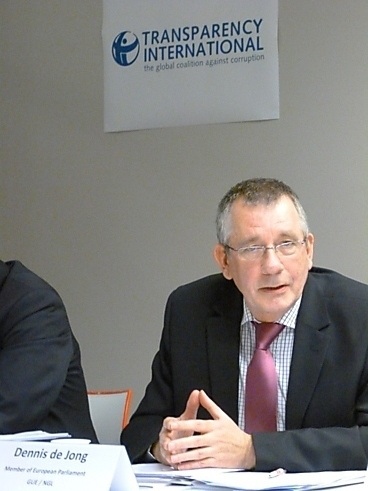Where’s Commissioner Malmström’s anti-corruption report?
Where’s Commissioner Malmström’s anti-corruption report?
Last week, Commissioner Malmström was due to produce her long-awaited report on corruption in the European Union. The report did not appear, however. The earliest we can now expect it is January. There was trouble inside the Commission. Had Malmström dealt with some member states too harshly? Or was it that she was too candid about abuses within the EU institutions themselves? We simply don’t know. But together with the United Nations, anti-corruption group Transparency International and lobby watchdog ALTER-EU, we will on Thursday be upping the pressure on the Commission. We are celebrating ten years of the UN Treaty against Corruption, and the EU played a major role during negotiations for this treaty, but if this continues, the role of the EU will lose its gloss. Time to take the gloves off.
 A few years ago, together with like-minded Euro-MPs, I drew up an action plan against corruption. In handing this over to Commissioner Malmström, we agreed that the Commission would give anti-corruption policy priority within the EU. We wanted to go much further much more quickly, but Malmström wanted to do things in her own way: before the end of 2013 there would be a thoroughgoing enquiry in which no member state would be spared, in the meantime I hear that Malmström has had her knuckles rapped by her colleagues. Just why is unclear, but the Swedish Commissioner is known for speaking her mind. She was possibly too candid and reported too honestly on the deteriorating situation in a number of member states. On 3rd December Transparency International will publish an updated Corruption Perception Index, a ranking of how corrupt countries are seen to be, in particular by business. It wouldn’t amaze me if a number of member states end up further down the list than they did in the past.
A few years ago, together with like-minded Euro-MPs, I drew up an action plan against corruption. In handing this over to Commissioner Malmström, we agreed that the Commission would give anti-corruption policy priority within the EU. We wanted to go much further much more quickly, but Malmström wanted to do things in her own way: before the end of 2013 there would be a thoroughgoing enquiry in which no member state would be spared, in the meantime I hear that Malmström has had her knuckles rapped by her colleagues. Just why is unclear, but the Swedish Commissioner is known for speaking her mind. She was possibly too candid and reported too honestly on the deteriorating situation in a number of member states. On 3rd December Transparency International will publish an updated Corruption Perception Index, a ranking of how corrupt countries are seen to be, in particular by business. It wouldn’t amaze me if a number of member states end up further down the list than they did in the past.
It could also be that the Commissioner has dedicated part of her report to integrity within the European Commission itself. I have urged them many times to at last send a report to the United Nations on how the Commission is implementing the UN anti-corruption treaty. To the annoyance of the UN they have refused to do so, because they don’t know precisely how far they can go in reporting on the member states, without treading on their toes. The member states will also, after all, be doing their own reports to the UN. That is, of course, the purest baloney. The upshot is that no report has been sent to the UN. They could, however, report on all the corruption scandals at the Commission and its agencies, such as that involving Maltese European Commissioner John Dalli, forced to resign after he was suspected of involvement in bribery by the tobacco lobby. Or consider all of the conflicts of interest involving officials and big business. Perhaps Malmström thought, with her first report for discussion within the Commission, that she’d be able to take a step on her way to producing a report for the UN. That would do her credit, but such transparency is not in the main to be expected from Commission president Jose Barroso. He was himself involved in any case in the Dalli scandal, via his right-hand man, Secretary-General Catherine Day, and so is compromised and in a difficult position, which may explain the fuss around Malmström’s first report.
On 5th December I am organising a meeting at the European Parliament for which the UN Bureau in Vienna is sending one of its best people. We won’t leave a single particle of the European Commission’s secretive behaviour to lie. If the EU wants to be party to the UN treaty, they need to fulfil their responsibilities. Alongside Transparency International and ALTER-EU we will provide the Commission with a number of building blocks for a decent report to the UN. If the Commission hasn’t the courage to do it itself, we’ll wash its dirty laundry in public. We could probably in this way provide support for Malmström in her struggle with more reticent (or less upright) colleagues in the Commission.
- See also:
- Dennis de Jong
